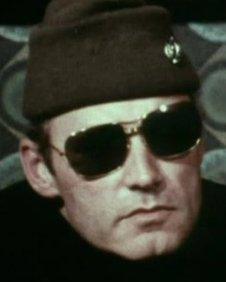Gusty Spence, former UVF leader, dies in hospital
- Published
The former loyalist paramilitary leader Gusty Spence has died in hospital. The 78-year-old had been ill for some time.
In the 1960s, he founded the modern Ulster Volunteer Force, an organisation which was responsible for hundreds of sectarian murders during the Troubles.
He was jailed for life for the murder of a Catholic barman in 1966 and served 18 years in prison.
He later became involved in politics and announced the landmark loyalist paramilitary ceasefires in 1994.
In 2007, he announced that the UVF and an associated group, the Red Hand Commando, would cease to exist in their previous form.
A former leader of the UVF's political wing, the Progressive Unionist Party, described him as "one of the pivots on which a page of Irish history turned".
'Incalculable contribution'
Brian Ervine said: "His contribution to the peace is incalculable and without him, probably the paramilitaries would still be at war.
"He was an Irishman and looked upon himself as an Ulster Irishman as well as being British.
"He was really a role model for many young men who would follow."
Spence's biographer Roy Garland said he had formed unlikely relationships and challenged conventional loyalist thinking.
He added: "He formed a relationship with Cardinal O'Fiach and that was in some of our ways of thinking in those days a big step because the Catholic church in particular were the enemy.
"He also sent a letter of condolence to the widow of Joe McCann, an IRA man, praising him as a soldier of Ireland."
Another former PUP leader, Dawn Purvis, said Spence's opinions began to shift sooner than is generally perceived.
She said: "Some people have said that in his later life, he changed to become committed to peace. It was not in his later life.
"Shortly after he was jailed, Gusty, after a period of reflection on his own life, quickly started to challenge other loyalists coming into prison to reflect on their own lives."
Sinn Fein MLA Gerry Kelly said many nationalists would remember Spence as someone "who was central to the sectarianism that gave birth to the modern loyalist paramilitary".
"However he did dedicate himself to peace and reconciliation for much of his later life so he will also be remembered as a major influence in drawing loyalism away from sectarian strife," he added.
"On behalf of Sinn Fein I would wish to extend my condolences to his family at this time."
Godfather
Spence is regarded as the first terrorist godfather in Northern Ireland but also the man who took the first steps towards ending UVF violence.
In May 1966, the UVF issued a statement, announcing that it was declaring war on the IRA.
While republicans were the expressed target, the attacks that followed were explicitly sectarian.
Spence was initially held over the murder of the first victim of the Troubles, John Scullion, who was shot by the UVF in the Falls Road area of Belfast.
The charges were dropped but later in 1966 he was given life for the murder of Peter Ward, who had called in to a Shankill Road bar with Catholic workmates and was shot dead as he left.
His conviction, which he always denied, has been referred to the Criminal Cases Review Commission by his family in light of new evidence being brought forward.
It was during his time in the Maze prison that Spence began to talk politics and encouraged others to do the same.
After his release December 1984, Spence was a key figure in developing UVF thinking and indirectly its political wing, the Progressive Unionist Party.
'True remorse'

Gusty Spence is regarded as one of the founders of loyalist paramilitarism
Almost 10 years later in October 1994, he was chosen to announce to the world that the main loyalist paramilitary groups, the UVF and the UDA, were declaring ceasefires in response to an IRA cessation.
Spence said loyalists offered "abject and true remorse" to the loved ones of all the innocent victims of the Troubles.
Reverend Chris Hudson, who helped broker contacts between loyalist paramilitaries and the Irish government, said that aspect of the statement was significant.
He added: "I think it helped to set some of the tone to bring us to where we are now."
But despite the statement, the UVF was subsequently involved in sporadic violence, including several murders.
However, following significant political pressure, the UVF claimed in 2007 that it was decommissioning its weapons.
After several years away from the spotlight, Spence was again asked to read the statement, a role which senior loyalists said was indicative of his significance within Northern Ireland loyalism.
- Published25 September 2011
- Published9 November 2010
- Published22 June 2011